| Nuts & Bolts (Darlaston)
Limited |
| The company was founded on 13th July, 1912, in Foster
Street, Darlaston, on the site of an old timber yard. One of
the co-founders was Alfred E. Owen.
Initially everything was hand-made. There were 12
treadle-operated 'Olivers' producing bolts. Nuts were
hand-forged and tapped. The first customers were mainly car
makers.
Within a short time, automatic machines were installed in
the factory, and in 1917 a cold-heading machine was
purchased from the USA.
Large numbers of horses were used in the hostilities in
World War One. During the war the factory fulfilled Ministry
orders for large numbers of frost studs for horseshoes, and
picketing pins for tethering horses. They were supplied to
all of the Allied forces. |
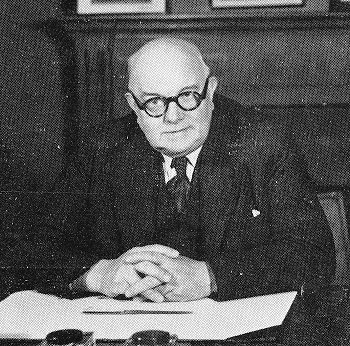
Mr. G. F. V. Richards, Managing
Director. From the Christmas 1949 edition of the staff
magazine "Goodwill". |
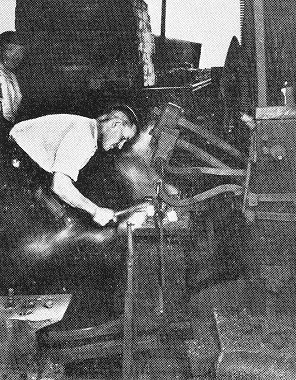
One of the original treadle-operated 'Olivers'.
From the Christmas 1949 edition of the staff magazine
"Goodwill". |
The furnaces, which were originally
coal-fired were replaced by more modern gas-burning types,
and semi-automatic machines were installed for tapping nuts.
In 1929 A.G.B. Owen became a Director on the death of his
father, and in 1934 the firm amalgamated with Evertite
Locknuts Limited to acquire manufacturing and distribution
rights for the well-known Evertite patent Evertite locknut,
millions of which were made at the works.
By the late 1930s the Darlaston factory
could no longer cope with the great demand for the company's
products, and so the decision was taken to open a new
factory at Tredegar, South Wales, an ideal location because
of the industrialisation in the area.
A suitable Government-owned site was
purchased by the company in Bridge Street, Tredegar. Before
the factory could be built, temporary premises were rented
from the Coal Board in order to begin production, and train
local employees. Production began in November 1937, when the
first nut ever produced in Tredegar came off the production
line. |
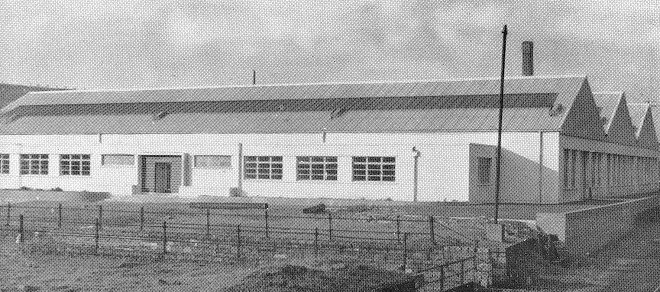
The Tredegar Factory. From the Christmas 1949
edition of the staff magazine "Goodwill".
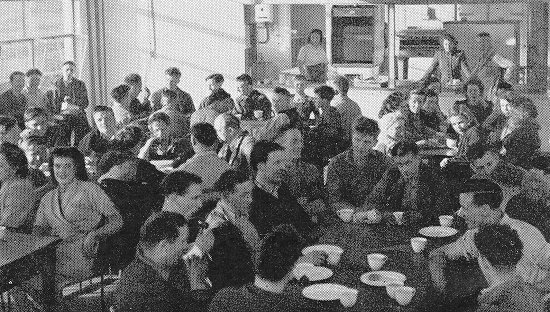
The works canteen at Tredegar. From
the Christmas 1949 edition of the staff magazine "Goodwill". |
Toolroom staff and experts in production from Darlaston
temporarily took-up residence in Tredegar to ensure that
production got off to a good start. The new factory,
covering 33,000 square feet, opened in March 1949 with 40
male, and 40 female workers. Three key staff from Darlaston
permanently moved to the area to oversee production. |
| By 1940 the Darlaston firm was producing cold-headed
bolts with diameters of ¼ of an inch to ¾ of an inch.
In the Second World War, thanks to the firm's high level
of mechanisation, thousands of special bolts were made for
use in the assembly and maintenance of tanks. |
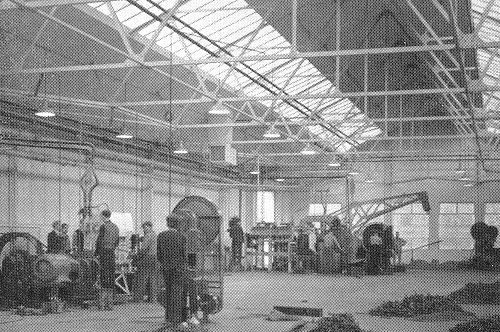
Part of the Tredegar factory. From the
Christmas 1949 edition of the staff magazine "Goodwill". |
|
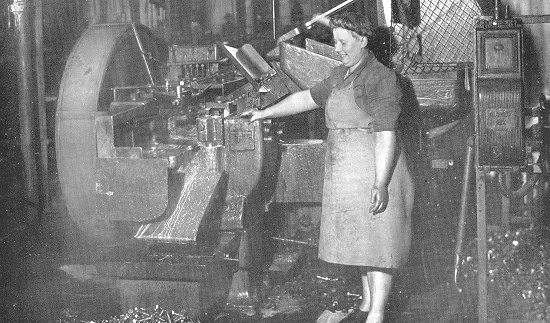
A Thread rolling machine at Darlaston. |
In 1945 Rubery Owen & Company Limited purchased the
total assets of Evertite, along with a controlling interest
in Nuts & Bolts (Darlaston) Limited. In the same year
E. W. B. Owen became a Director. |
| In the late 1940s, nuts and bolts made for railways,
rolling stock manufacturers, shipbuilders, structural
engineers, bridge builders, public works contractors, and
collieries, etc.
The firm supplied nuts and bolts to almost every country
including Africa, Australia, South America, and India. Around
30% of the total production was exported.
Nuts and bolts for special applications were made up to
several feet long, and several inches in diameter.
Products could be plated to the
customer's specification, or galvanised in the
company's spelter galvanising plant. |
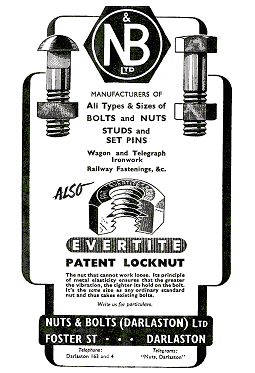
An advert from 1946.
|
The firm took-out many patents including:
|
1948 |
Special furnace for heating pins or billets. |
|
1950 |
Furnaces for heating pins or billets. |
|
1951 |
Tool for cutting one axial half of an
internal groove in an open-ended hollow article. |
|
1951 |
Lock-nuts with an internal 'V' groove. |
|
1952 |
Improvements in tools for cutting internal
grooves. |
|
1953 |
Machine for cutting internal grooves in
open-ended hollow articles. |
|
1962, 1963 |
Locking or sealing nuts and bolts by
cementing. |
|
1965 |
Special dies for self-locking nuts. |
|
1965 |
Improved screw-threaded connections. |
| |
|
|
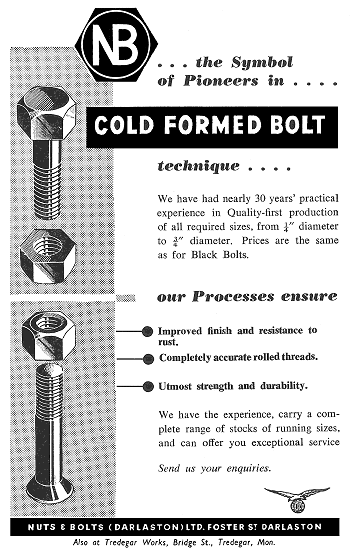
An advert from the mid 1950s. Courtesy
of Christine and John Ashmore. |
There were two subsidiary companies, Hartley &
Baldwin Limited, Willenhall Street, Darlaston, which
produced black bolts and nuts, and tie rods, and J.
Stanley & Company Limited, Wednesfield Road,
Willenhall, which produced drop forgings in all
steels, brass forging engineer's hammers, and small
tools. |
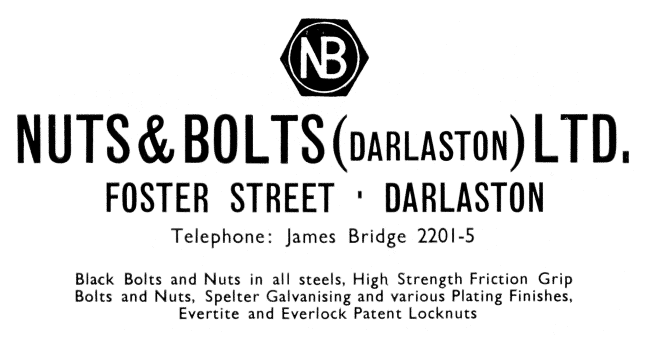
| Production at the
Darlaston Factory |
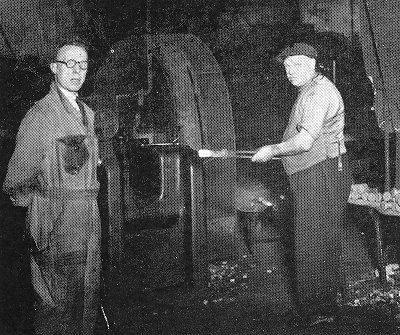 |
On the left, Mr. A. E. Garbett,
Works Engineer, on the right, Mr. Enoch Fields, operating a
bolt-heading machine. From
the autumn 1949 edition of the staff magazine "Goodwill". |
Nut frazing machine
operators. Left to right:
Jennie Norman, Katherine Bott, May Perkins, and Margaret
Stackhouse, who joined the firm in 1919.
From the autumn 1949 edition of the
staff magazine "Goodwill". |
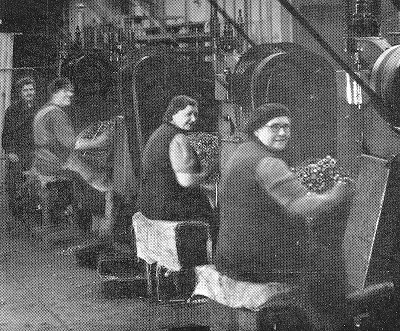 |
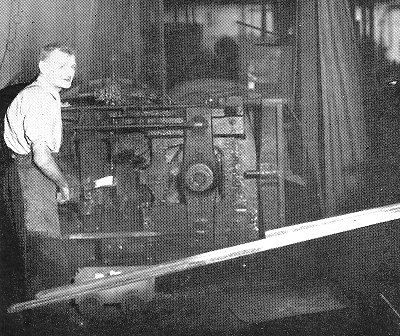 |
Mr. Sam Robinson forging Evertite
nut blanks. From the autumn
1949 edition of the staff magazine "Goodwill". |
| Rolling bolt threads.
From the Christmas 1949 edition of the
staff magazine "Goodwill". |
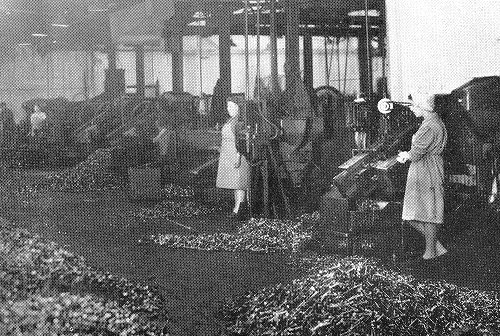 |
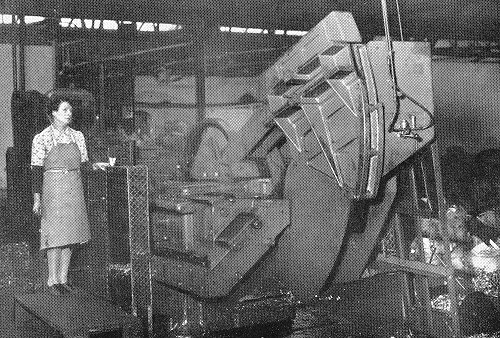 |
Cutting the hexagon shape on the
heads of bolts. From the
Christmas 1949 edition of the staff magazine "Goodwill". |
| Cold-heading bolts.
From the Christmas 1949 edition of the
staff magazine "Goodwill". |
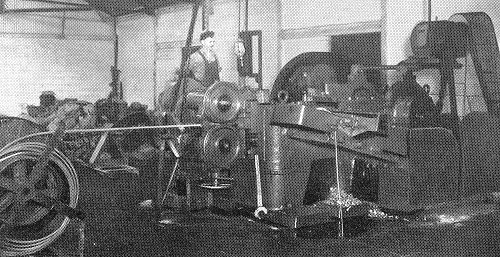 |
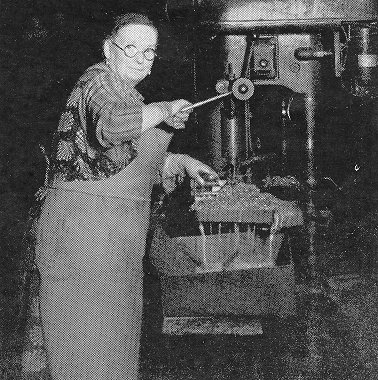 |
Mrs. Bray, who joined the company
in 1914, drilling holes in bolts for cotter pins.
From the Christmas 1949 edition of the
staff magazine "Goodwill". |
| Mrs. Vin. Foster who joined the
company in 1918, screwing bolts.
From the Christmas 1949 edition of the
staff magazine "Goodwill". |
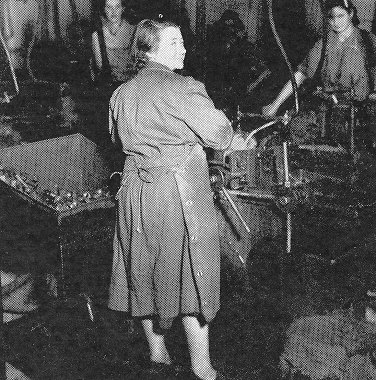 |
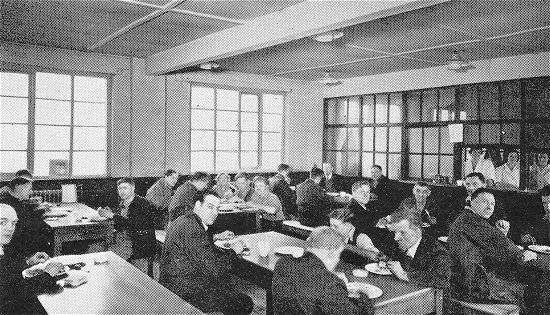 |
The works canteen.
From the Christmas 1949 edition of the
staff magazine "Goodwill". |
|
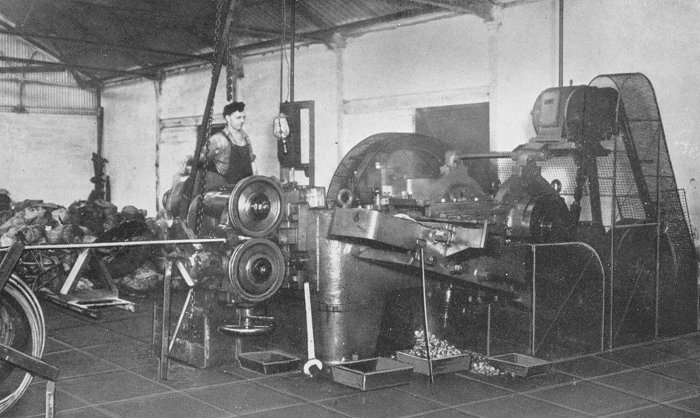
A cold-heading machine for
the automatic forging of bolt heads. |
|
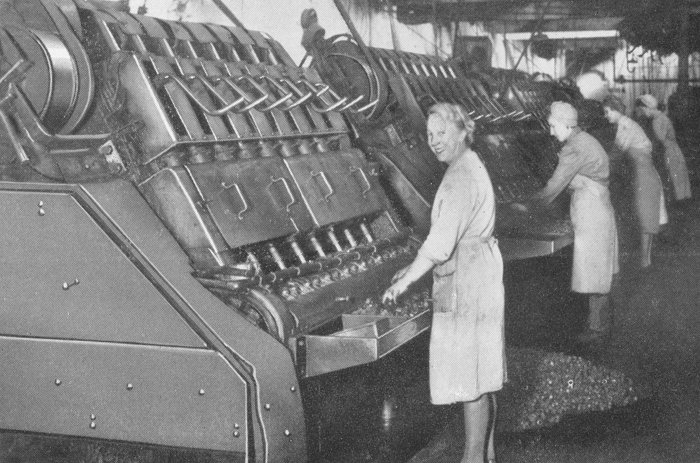
Nut threading machines. |
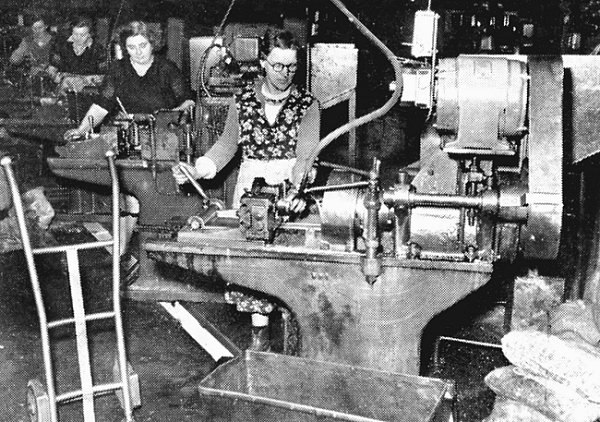 |
Part of the Screwing Machine Shop
in the mid 1950s. Courtesy of
Christine and John Ashmore. |
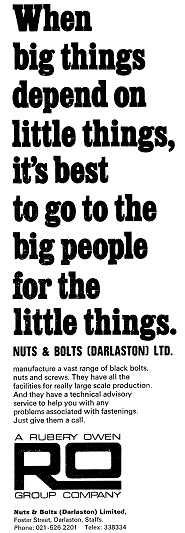 |
|
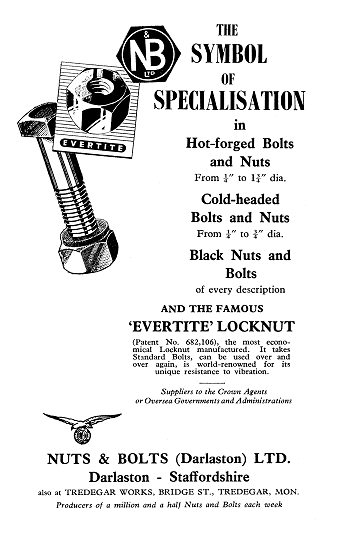 |
|
An
advert from 1972. |
|
An
advert from 1963. |
|
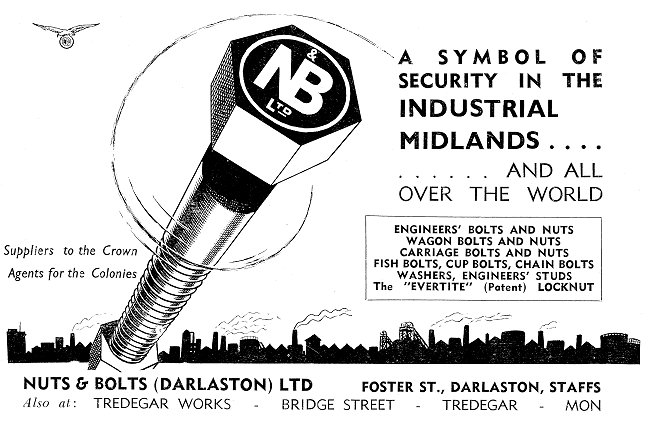
An advert from 1954.
|
In 1980 the Foster Street factory
closed, and production facilities were transferred to a
new company, Moxley
Fasteners Limited.
|
 |
Return to
the
previous page |
|